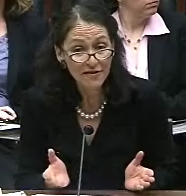US import screening programme "back on track", says FDA chief
Phil Taylor, 14-Apr-2011
 The roll-out of a web-based screening programme to help ensure the quality and safety of medicines and foods imported into the USA is gaining momentum after initial software problems, according to Food and Drug Administration Commissioner Margaret Hamburg.
The roll-out of a web-based screening programme to help ensure the quality and safety of medicines and foods imported into the USA is gaining momentum after initial software problems, according to Food and Drug Administration Commissioner Margaret Hamburg.
Providing testimony at a US House of Representatives Subcommittee on Oversight and Investigations meeting yesterday, Hamburg said the PREDICT (Predictive Risk-Based Evaluation for Dynamic Import Compliance Targeting) system is currently screening around 40 per cent of imported food and medicinal products, and that this will increase to 50 per cent later this month.
Members of the Committee convened the meeting specifically to ask for an update on PREDICT and other FDA initiatives to improve the safety of food and drug imports in the USA.
Initially rolled out in Los Angeles last year, the PREDICT system is now running in New York, Seattle and San Francisco, and will roll-out in Florida and San Juan later this month. If successful it will then be rolled out across the USA, said Hamburg.
"Up to 40 per cent of the drugs Americans take are manufactured outside our borders, and up to 80 per cent of the active pharmaceutical ingredients in those drugs come from foreign sources," she told the meeting.
Citing cases involving medicines counterfeiting, the adulteration of glycerine used in the manufacture of medicines with the toxic solvent diethylene glycol, infant formula and pet food contaminated with melamine and the economically-motivated adulteration of heparin in 2008, Hamburg said the task facing the FDA cannot be tackled via inspections alone.
"The risk to the US food and medical products supply comes from sources around the world," she said, noting that the agency "does not have the resources on the ground" to inspect overseas manufacturing facilities.
This means that effective screening of imports at the USA's borders is a critical component of securing the food and drug supply.
PREDICT is designed to allow border inspectors to monitor products at the port of entry and to focus inspections on shipments that pose the greatest risk. The system makes use of barcode scanners linked to a centralised database which can raise an alert if the shipment is high-risk, for example if it originates from a source associated with past violations.
The system was originally due to be operating across the USA in 2010, but had to be delayed after field agents reported communication with the centralised database was too slow to allow them to keep up with the volume of imports needing to be screened.
"With PREDICT, our investigators will still physically examine only a small percentage of all import shipments - but they will have better intelligence available at their fingertips to decide which shipments to examine," said Hamburg.
Providing some early data on the effectiveness of the system, Hamburg noted that the likelihood of detecting a violation was 11 times higher for higher-risk items with PREDICT, while it cleared three times as many lower-risk items automatically compared to the old system, expediting entry into the US supply chain.
Hamburg also stressed at the committee meeting that PREDICT is just part of a panoply of initiatives at the FDA with the aim of improving import safety.
"We want to reach back further, closer to where the products are ... manufactured, and try to build in assurances of safety and quality from the very beginning and throughout the supply chain," she told the hearing.
Other FDA measures include the recently-introduced Drug Integrity and Security Programme, which covers issues such as counterfeiting, economically-motivated adulteration and cargo theft.
The agency needs greater enforcement powers, including: refusal to allow product into the country if inspection of facilities is "delayed, limited or denied;" mandatory product recall powers, rather than the current voluntary system for medicines; having "express authority" to address threats to US consumers arising outside the USA; the power to destroy violative shipments; and enhanced criminal and civil penalties for suppliers of counterfeit and otherwise illegal products.
Interestingly, the Commissioner also specified a mandatory track-and-trace system for all products "throughout the domestic and foreign supply chain" to ensure accountability of product manufacturing and distribution.
The issue of resources at the FDA was also raised, with Hamburg acknowledging that the proposed reduction in 2012 funding for the agency will be "enormously difficult to absorb."
The text of Hamburg's testimony is available for download here, while an archived webcast of the proceedings can be viewed on the Subcommittee website.

©
SecuringIndustry.com




 The roll-out of a web-based screening programme to help ensure the quality and safety of medicines and foods imported into the USA is gaining momentum after initial software problems, according to Food and Drug Administration Commissioner Margaret Hamburg.
The roll-out of a web-based screening programme to help ensure the quality and safety of medicines and foods imported into the USA is gaining momentum after initial software problems, according to Food and Drug Administration Commissioner Margaret Hamburg.